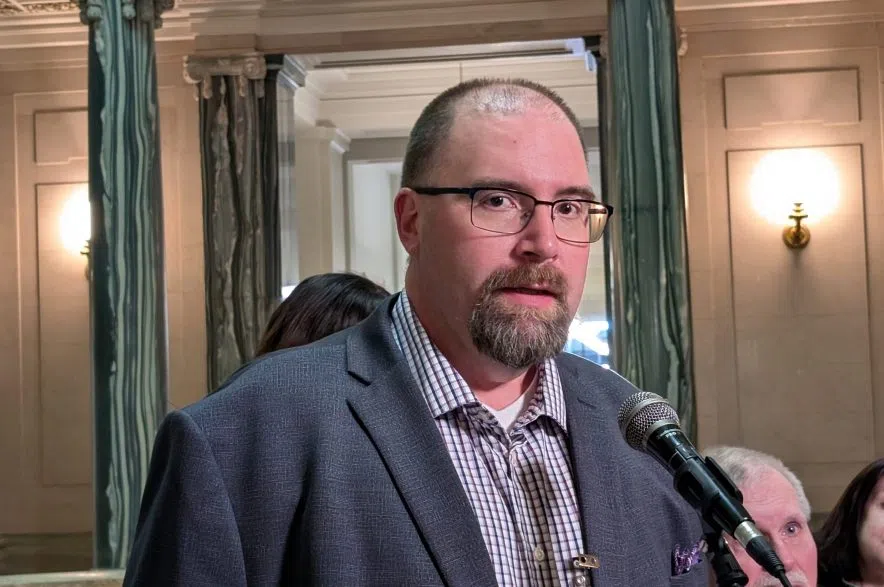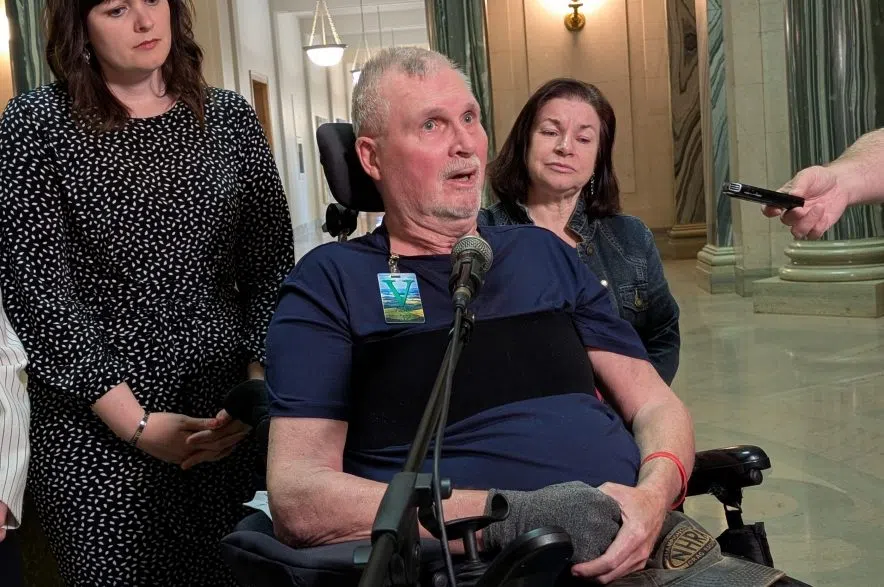Terry Loustel was diagnosed with ALS in 2022. Since then, he’s gone from walking with a cane to needing a wheelchair and numerous expensive accessibility modifications to his home.
Loustel has had to rely on support from the ALS Society of Saskatchewan, which is calling for $150,000 in annual funding from the provincial government.
Read more:
- Canadian researchers reach ‘major milestone’ in search for ALS treatment
- Sask. NDP calls for an end to virtual health care in emergencies
- Sask. children’s hospital nurse fired after snooping on 314 patients
Denis Simard of the ALS Society called it a “nominal” amount” meant to offset the costs for staff that provide mental health supports for patients across the province.
Amyotrophic lateral sclerosis (ALS) is also known as Lou Gehrig’s disease and is a fatal neuro degenerative condition with no known cure.
“It’s devastating,” Loustel said, describing what it was like to live with ALS.
“That’s the first word that comes to mind. It just completely takes over your body and day by day, you just get to do less and less.”
Loustel lives in Buena Vista, a village about 51 kilometres northwest of Regina. He lives with his wife, a nurse who he says had to retire to take care of him.
“When you initially get it, you’re still able to walk (and) do everything on your own, but as it progresses you lose the ability to do all those things,” he said.
“I no longer can dress myself. I can’t go to the bathroom by myself. I can’t cut my food up by myself. I’m still able to feed myself with my left hand — I’m right handed — as long as it’s in chunks where I can stab with a fork.
“But eventually, probably within a month to six weeks, I won’t be able to even feed myself anymore. I’ll have to have somebody feeding me. So at that point, I will be 100 per cent dependent on somebody to do everything for me, which is not a fun way to live, especially if you’ve been an active person like I was.”

Denis Simard of the ALS Society of Saskatchewan said the organization estimates there are up to around 125 people with ALS in Saskatchewan. (Lisa Schick/980 CJME)
Simard says the society has had dozens of meetings with the province but never seems to be able to move the funding needle and their requests are always being denied.
ALS Society of Saskatchewan relies on $150,000 to $200,000 in donor support annually.
Simard says the ALS ice bucket challenge that went viral on social media in 2014 provided the organization with “a ton” of funding that enabled the organization to survive for another 10 years.
The challenge was started three young American men living with ALS and inspired over 17 million people around the world to dump ice water on their heads and donate to an ALS organization.
Simard said 73 people are registered with the ALS clinic in Saskatoon. The society has a full-time social worker employed at the clinic and also works with organizations like SaskAbilities to provide equipment like that used by Loustel.
“We were able to provide all those services we do because of those funds. But now, 11 years later, those funds don’t exist anymore, so now we have to start (making) a difficult choice,” Simard said.
“The truth is, we’re about two years away from having to say, ‘if something doesn’t change, we’re done.’ And so if we don’t do this, if we don’t support people like Terry and the other 70-plus people in this province who will — and that’s the question we keep asking.”
Simard said the society estimates there to be up to around 125 people with ALS in the province.
“It becomes emotionally draining on you more than anything. Losing your physical ability is one thing but the emotional drain it puts on you and the mental strain becomes quite intense,” Loustel said.
Health Minister says funding will be considered
Health Minister Jeremy Cockrill said he had met with the ALS Society of Saskatchewan and was aware of their previous proposals but he hadn’t heard of the concerns about having to potentially close their doors.
“Typically, we don’t provide base funding for organizations like this, but we certainly work with many different organizations in the province on different projects or different initiatives,” Cockrill said.
He said the province would consider providing funding as part of next year’s budget.
“We entertain proposals like this from, I said dozens, but it might even be hundreds of different organizations all over the province,” Cockrill said.
“The challenge is we don’t fund everything that we’re asked for. This is the hard part about being an elected government, whether you’re at the provincial level or municipal level — sometimes stuff doesn’t get prioritized in a budget cycle.
“But I think the most important thing is that you continue the discussion with those groups, whether it’s the ALS Society or another organization, and always keep those doors open. The door is open.”
Read more:











